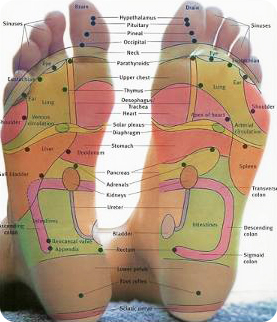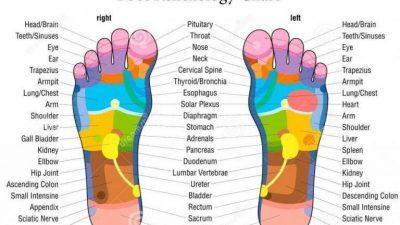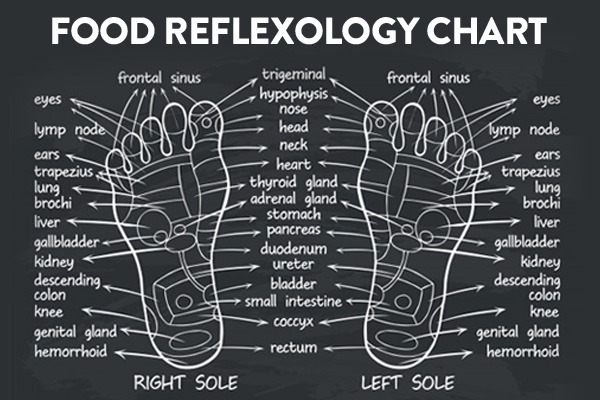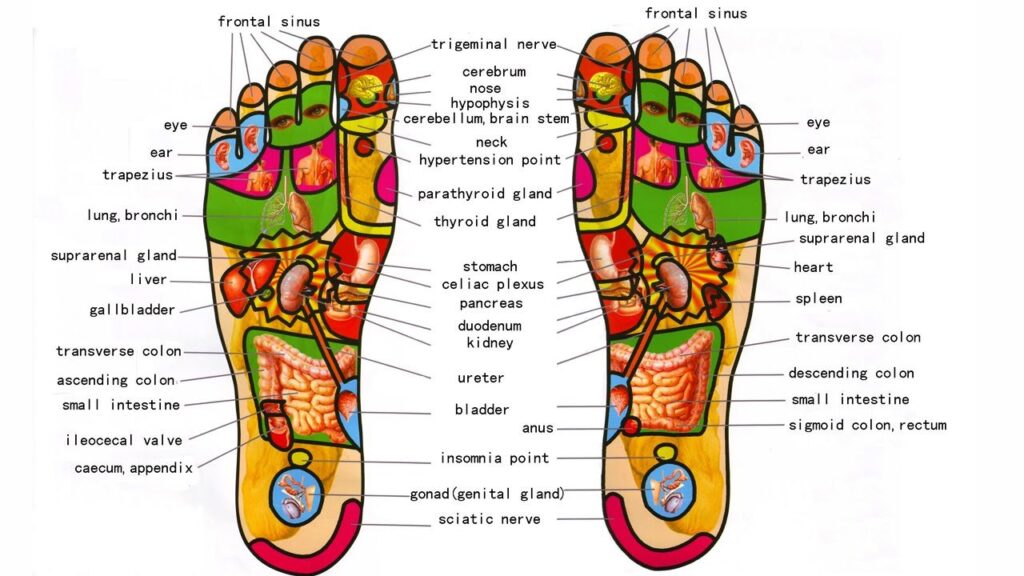Are you curious about how long a reflexology course typically lasts? Look no further! Centre of Wellness is here to provide you with the answers you seek. If you’re interested in getting trained in the art of reflexology, Centre of Wellness offers online classes that can help you achieve your goals. With their convenient and accessible courses, you can learn the intricacies of reflexology from the comfort of your own home. So, if you’re ready to embark on a journey of knowledge and self-improvement, visit beautytrainingcoursesonline.com/courses-overview to learn more about how long a reflexology course truly is.

This image is property of londonschoolofmassage.co.uk.
Understanding Reflexology
What is Reflexology?
Reflexology is a practice that involves the application of pressure to specific areas of the feet, hands, or ears to promote healing and relaxation in corresponding areas of the body. It is based on the belief that these areas, known as reflex points, are connected to different organs and systems of the body, and by applying pressure to them, balance and harmony can be restored.
Benefits of Reflexology
Reflexology offers a wide range of benefits for both physical and mental well-being. It can help reduce stress and anxiety, relieve pain and discomfort, improve circulation, boost the immune system, and promote better sleep. Additionally, reflexology has been found to enhance the body’s natural healing abilities, support detoxification, and improve overall energy levels. With regular sessions, many people have experienced increased relaxation, improved mood, and a sense of overall well-being.
How Does Reflexology Work?
The underlying principle of reflexology is that specific reflex points on the feet, hands, and ears correspond to specific organs, glands, and body parts. By applying pressure to these reflex points, the corresponding areas of the body can be stimulated, promoting healing and restoring balance. Reflexologists use various techniques, including thumb and finger pressure, kneading, and massage, to apply gentle pressure to these reflex points. This pressure sends signals to the nervous system, which then triggers a response in the corresponding body part, helping to alleviate any imbalances or blockages.
Duration of Reflexology Courses
Different Course Options
When considering a career in reflexology, it’s essential to understand the duration of the various course options available. Reflexology courses can range from short certificate programs to more in-depth diploma programs. Additionally, online courses have gained popularity, offering flexible learning options for those with busy schedules or geographical constraints.
Certificate Programs
Certificate programs in reflexology are a great option for individuals looking to gain a basic understanding of the practice and develop the necessary skills to provide reflexology treatments. These programs generally have a shorter duration, typically ranging from a few weeks to a few months, depending on the intensity and frequency of the classes. Certificate programs focus on teaching the fundamental techniques and theories of reflexology, providing a solid foundation for further specialization or professional practice.
Diploma Programs
Diploma programs in reflexology offer a more comprehensive and in-depth education in the field. These programs are designed for individuals who wish to pursue a career as a professional reflexologist or expand their knowledge beyond the basic concepts of reflexology. The duration of diploma programs can vary, but they generally range from six months to a year, depending on the program’s structure and intensity. Diploma programs often cover a broader range of topics, including advanced techniques, anatomy and physiology, pathology, and business skills. They typically require a higher level of commitment and may involve hands-on practical training and supervised clinical practice.
Certificate Reflexology Courses
Overview of Certificate Courses
Certificate courses in reflexology provide a focused and concise introduction to the practice. These courses are designed to equip students with the essential knowledge and skills to perform reflexology treatments safely and effectively. The curriculum typically covers topics such as the history and principles of reflexology, understanding reflex points, basic anatomy and physiology, and hands-on practice. Certificate courses offer a great starting point for individuals interested in exploring reflexology as a hobby or those looking to incorporate it into other wellness or healthcare practices.
Typical Duration of Certificate Courses
The duration of certificate courses in reflexology can vary depending on the institution and the specific program. Generally, certificate courses range from a few weeks to a few months. Some programs may offer intensive courses that can be completed within a shorter duration, while others may provide more extended part-time options to accommodate students’ schedules. It is essential to consider your time availability and learning preferences when choosing a certificate course that suits your needs.
Course Curriculum
Certificate courses in reflexology typically cover the fundamental concepts and techniques required to perform reflexology treatments. The curriculum often includes theoretical components, such as the history and philosophy of reflexology, understanding the body’s energy system, and the principles behind reflexology’s effectiveness. Students also learn practical skills, including proper hand and finger techniques, locating and working with reflex points, and conducting a reflexology session. Some certificate courses may also touch upon related topics like client communication, hygiene and safety, and basic business practices.
Diploma Reflexology Courses
Overview of Diploma Courses
diploma courses in reflexology provide a more comprehensive and in-depth education in the field. These courses offer a higher level of training and are suitable for individuals aspiring to become professional reflexologists or those seeking advanced knowledge and skills in the practice. Diploma courses go beyond the basics and delve into more complex topics, such as advanced reflexology techniques, pathology, and professional practice.
Typical Duration of Diploma Courses
Diploma courses in reflexology generally have a longer duration compared to certificate programs. The typical duration can vary depending on the program and institution, with courses ranging from six months to a year. The longer duration allows for a more thorough exploration of the subject matter, covering advanced techniques and in-depth understanding of the body’s systems and reflex points. Diploma courses often include both theoretical and practical components, providing students with a well-rounded education and ample hands-on experience.
Course Curriculum
The curriculum of diploma courses in reflexology is designed to equip students with comprehensive knowledge and advanced skills in the practice. In addition to covering the topics included in certificate courses, diploma programs typically delve deeper into the anatomy and physiology of the body, the role of reflexology in managing specific health conditions, and more advanced reflexology techniques. Students may also gain insights into business management, professional ethics, and client management, preparing them for successful careers as reflexologists.

This image is property of www.hampsontrainingacademy.co.uk.
Online Reflexology Courses
Benefits of Online Learning
Online reflexology courses have gained popularity due to their flexibility and accessibility. Learning online allows individuals to study at their own pace and convenience, making it an excellent option for busy professionals or those unable to attend traditional in-person classes. Online courses offer the flexibility of setting your own study schedule and allow you to access course materials at any time, eliminating geographical constraints and providing the opportunity for individuals from all around the world to enroll.
Flexibility of Online Courses
One of the significant advantages of online reflexology courses is the flexibility they offer. With online learning, you have the freedom to study at your own pace and schedule. You can access course materials and lectures whenever it is convenient for you, allowing you to balance your learning with other commitments. Whether you prefer to study early in the morning, late at night, or on weekends, online courses provide the flexibility to accommodate your personal and professional life.
Accredited Online Courses
When considering online reflexology courses, it is important to choose accredited programs. Accreditation ensures that the course meets certain quality standards and is recognized by professional organizations and employers. Accredited online courses have undergone a rigorous evaluation process to ensure that they provide a high level of education and meet the required curriculum standards. By choosing accredited online courses, you can have confidence in the quality and credibility of the training you receive.
Choosing a Reflexology Course
Factors to Consider
When choosing a reflexology course, there are several factors to consider. Firstly, assess your goals and determine whether you are interested in gaining a fundamental understanding of reflexology or pursuing a professional career as a reflexologist. Additionally, consider your time availability and preferred learning format. Some individuals may thrive in a traditional classroom setting, while others may prefer the flexibility of online learning. It is crucial to choose a course that aligns with your goals, preferences, and learning style.
Accreditation and Certification
Ensure that the reflexology course you choose is accredited by a reputable organization. Accreditation validates the quality and credibility of the program, giving you confidence in the education you receive. Additionally, consider if the course offers certification upon completion. Certification demonstrates your proficiency in reflexology and can enhance your credibility and employability in the field.
Instructor Qualifications
The qualifications and experience of the instructors are crucial when selecting a reflexology course. Research the background and credentials of the instructors to ensure that they are skilled and knowledgeable in the field of reflexology. Experienced instructors can provide valuable insights, practical guidance, and mentorship, enhancing your learning experience and preparing you for a successful career.

This image is property of www.imosha.com.
Finding Reflexology Courses
Professional Institutions
Professional institutions and organizations dedicated to reflexology often offer comprehensive training programs and courses. These organizations may provide a list of accredited institutions and online platforms that offer reflexology courses. Research reputable professional institutions in your area to find out about their course offerings and access their resources for finding reflexology courses.
Local Wellness Centers
Local wellness centers and spas sometimes offer reflexology courses for individuals interested in learning the practice. These courses may be suitable for individuals looking for a more practical and hands-on learning experience. Check with wellness centers in your area to inquire about any upcoming reflexology courses they may be offering.
Online Course Platforms
Numerous online platforms offer reflexology courses taught by experienced instructors. These platforms allow you to access a wide range of courses from anywhere in the world, giving you the opportunity to learn from top professionals in the field. Research reputable online course platforms that specialize in holistic health and wellness to explore the variety of reflexology course options available.
Cost of Reflexology Courses
Varies based on Course Type
The cost of reflexology courses can vary depending on the type of course, the duration, and the institution offering it. Certificate courses tend to be more affordable compared to diploma programs due to their shorter duration and focused curriculum. Additionally, online courses may have different pricing structures based on the level of support and resources provided. It is essential to consider your budget and financial resources when choosing a reflexology course.
Additional Expenses to Consider
In addition to the course fees, there may be additional expenses to consider when enrolling in a reflexology course. These expenses may include textbooks, study materials, and equipment required for practical training. It is advisable to inquire about any additional expenses upfront to have a clear understanding of the total cost of the course.
Financial Assistance Options
If the cost of a reflexology course is a concern, there may be financial assistance options available. Some institutions offer scholarships, grants, or installment plans to help make the course more affordable. Additionally, research if there are any government or private organizations that provide financial aid or scholarships specifically for holistic health and wellness education. Exploring these options can assist you in pursuing your passion for reflexology without significant financial burden.

This image is property of suaithaimassagetrainingcenter.com.
Practical Training and Hands-On Experience
Importance of Practical Training
Practical training and hands-on experience are essential components of a comprehensive reflexology course. While theoretical knowledge provides a foundation, practical training allows students to apply their knowledge and develop their skills in a real-world setting. Through hands-on experience, students learn how to properly apply pressure to reflex points, understand the tactile responses of different individuals, and refine their technique for optimal results. Practical training enhances confidence, proficiency, and prepares students for successful reflexology practice.
Clinical Practice Requirements
Some reflexology courses may have a clinical practice component, where students are required to complete a certain number of supervised reflexology sessions. These sessions provide an opportunity for students to work with actual clients, further refining their skills under the guidance and supervision of experienced reflexology practitioners. Clinical practice requirements ensure that students gain practical experience in a controlled and supportive environment, preparing them for the realities of a reflexology career.
Internship Opportunities
Certain reflexology courses may offer internship opportunities, allowing students to gain hands-on experience in professional reflexology settings. Internships provide invaluable real-world exposure, allowing students to observe and learn from established practitioners, expand their network, and gain insight into the day-to-day operations of a reflexology practice. Internships can greatly enhance students’ learning experience and help them build relationships within the industry, potentially leading to future employment opportunities.
Conclusion
Understanding the duration and options available for reflexology courses is crucial when embarking on a journey to learn this ancient healing art. Whether you choose a certificate course to develop a basic understanding or a diploma program to pursue a professional career, it is important to select a course that aligns with your goals and preferences. With the flexibility of online courses and the availability of practical training, embarking on a reflexology course can be an exciting step towards gaining the skills and knowledge to promote well-being and help others on their healing journey.


